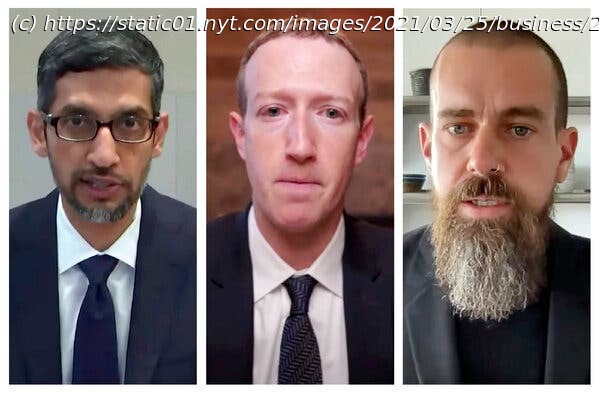The leaders of Google, Facebook and Twitter faced sharp questions about misinformation’s role in the attack and the mental health of children who use their products.
Lawmakers grilled the leaders of Facebook, Google and Twitter on Thursday about the connection between online disinformation and the Jan.6 riot at the Capitol, causing Twitter’s chief executive to publicly admit for the first time that his product had played a role in the events that left five people dead. When a Democratic lawmaker asked the executives to answer with a “yes” or a “no” whether the platforms bore some responsibility for the misinformation that had contributed to the riot, Jack Dorsey of Twitter said “yes.” Neither Mark Zuckerberg of Facebook nor Sundar Pichai of Google would answer the question directly. The roughly five-hour hearing before a House committee marked the first time lawmakers directly questioned the chief executives regarding social media’s role in the January riot. The tech bosses were also peppered with questions about how their companies helped spread falsehoods around Covid-19 vaccines, enable racism and hurt children’s mental health. It was also the first time the executives had testified since President Biden’s inauguration. Tough questioning from lawmakers signaled that scrutiny of Silicon Valley’s business practices would not let up, and could even intensify, with Democrats in the White House and leading both chambers of Congress. The chief executives have become Capitol Hill regulars in recent years. Mr. Zuckerberg has testified seven times since 2018. Mr. Dorsey has appeared five times and Mr. Pichai has testified four times since then. But these hearings, regarding disinformation, antitrust and data privacy, have not led to regulations. Though there is bipartisan animus toward the companies, there is still little agreement on how specifically to hold the internet giants to account. Dozens of privacy, speech and antitrust bills have gone nowhere in the past few years. “It will be very challenging to translate these concerns into legislation,” said Alexandra Givens, the chief executive of the Center for Democracy and Technology, a tech think tank. At the heart of the hearing were questions about whether the companies had a financial incentive to keep users engaged — and clicking on ads — by feeding them divisive, extreme and hateful content. Lawmakers from both parties said Congress should reconsider a law that shields the platforms from lawsuits over content posted by their users. “You’re not passive bystanders,” said Representative Frank Pallone, the New Jersey Democrat who chairs the House Energy and Commerce Committee. “You’re making money.” Lawmakers, who compared the business practices of social media companies to tobacco and alcohol companies, grew frustrated at times with what they said was the executives’ evasiveness.
Домой
United States
USA — IT Lawmakers Grill Tech C.E.O.s on Capitol Riot, Getting Few Direct Answers






